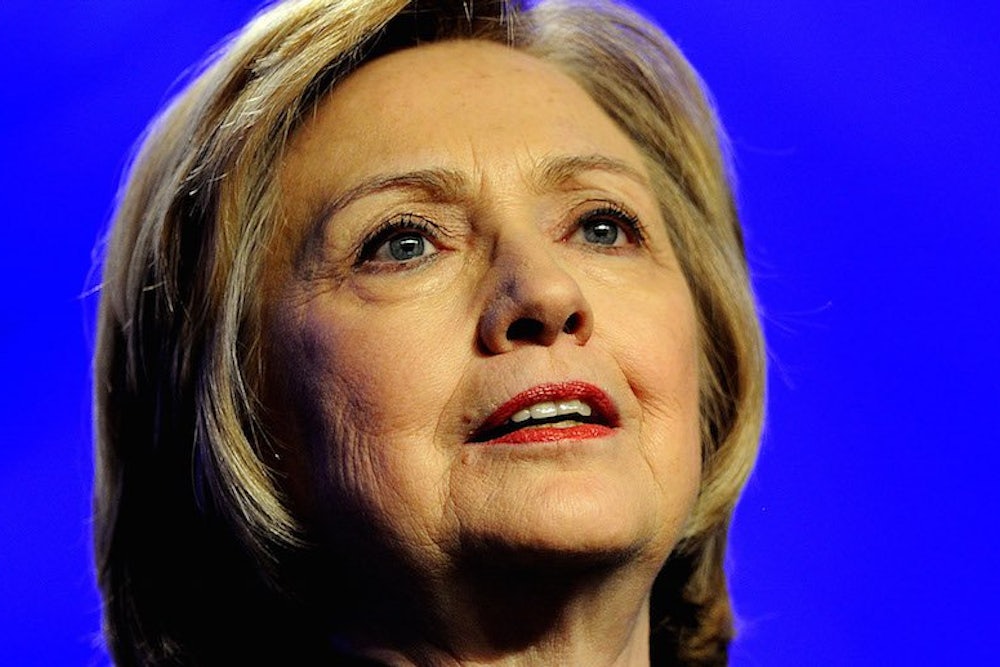Hillary Clinton, who reportedly will announce her candidacy this weekend, is such a prohibitive favorite to win the Democratic presidential nomination that she more or less cleared the field simply by behaving like someone who was going to run. That’s as much a testament to her political talent as it is to her nominal association with the boom times of the late 1990s. But it’s also the source of genuine anxiety among liberals, who worry she’ll enter the general election rusty and untested unless someone formidable dares to challenge her in the primary.
This sounds like a reasonable point, until you apply the logic to all other major political races, where favored candidates labor tirelessly to avoid primary campaigns, whenever possible. No losing Senate candidate has ever looked back and wished he’d endured a primary to loosen him up, and no winning Senate candidate ever has ever attributed his victory to the months he spent doing battle with members of his own party. Senate Republicans attribute the two recent election cycles they spent in the minority to undisciplined activists backing primary challengers, and attribute their recent victory to hobbling those activists.
In Hillary Clinton’s case, though, there’s still a good argument that the Democratic Party could use a contested primary this cycle: not to toughen Clinton’s calluses, but to build some redundancy into the presidential campaign. It may even be the case that some of these Democrats with rattled nerves are less anxious about Clinton’s prowess against Republicans than about the fact that all of the party’s hopes now rest on her shoulders. Her campaign has become a single point of failure for Democratic politics. If she wins in 2016, she won’t ride into office with big congressional supermajorities poised to pass progressive legislation. But if she loses, it will be absolutely devastating for liberalism.
If you’re faithful to the odds, then most of this anxiety is misplaced. Clinton may have slipped in the polls by virtue of an email scandal and her return to the partisan trenches more generally. But she's still more popular and better known than all of the Republicans she might face in the general, her name evokes economic prosperity, rather than global financial calamity, the economy is growing right now, and Democrats enjoy structural advantages in presidential elections, generally.
But all candidates are fallible, and most of them are human, which means every campaign labors under the small risk of unexpected collapse. The one real advantage of a strong primary field is that it creates a hedge against just such a crisis. Right now either Wisconsin Governor Scott Walker or Jeb Bush is favored to win the Republican primary, but if both of them succumb to scandal or health scares, the GOP can shrug it off knowing that other seasoned Republicans have infrastructure in place, and are poised to swoop in if necessary.
If nobody serious challenges Hillary Clinton, nobody can be her understudy. In the near term that isn’t a problem, but if doubts about her inevitability develop late in the year or early next, the placid silence in the Democratic field will grow eerie.
The GOP’s dominance in last year’s midterms (and the dividends their victory in 2010 keeps paying) exacerbates this risk. The House of Representatives probably isn’t in play next year. The Senate barely is. Hillary Clinton must by now have reconciled herself to the possibility that her first two years, and possibly more, will be gridlocked, or defined by unsatisfying compromises with congressional Republicans. Her imprint on the Supreme Court might be dramatic, or she might end up replacing one liberal justice of particularly advanced age.
The opportunity facing Republicans is precisely the reverse. The current distribution of power on Capitol Hill is such that if a Republican wins the presidency, he will come into the White House with his party in complete control of Congress, confident he'll be able to alter the balance of power on the Court for a generation. He will have eight years worth of Democratic progress on issues like health care, immigration, and climate change to roll back. The nature of our system makes it easier for opposition candidates to ride the political pendulum back toward their ideological comfort zones than for incumbent candidates to keep it aloft.
As Ed Kilgore wrote for TPM, “It’s just a matter of time until a competition breaks out that culminates with demands and promises to repeal everything Obama ordered, including regulations needed to implement everything Congress passed since 2009.”
For better or worse, if Clinton becomes president, her greatest accomplishment might be to rescue Obama’s legacy from a bottled up campaign of retribution. That’s an awkward agenda to run on (though if the Supreme Court wipes out billions of dollars in Obamacare subsidies this summer, it will be an easy agenda to dramatize). But it’s an incredibly important objective either way. And there’s no backup plan.
